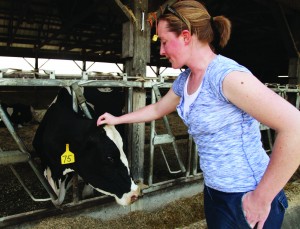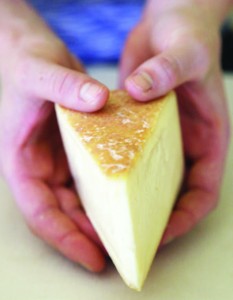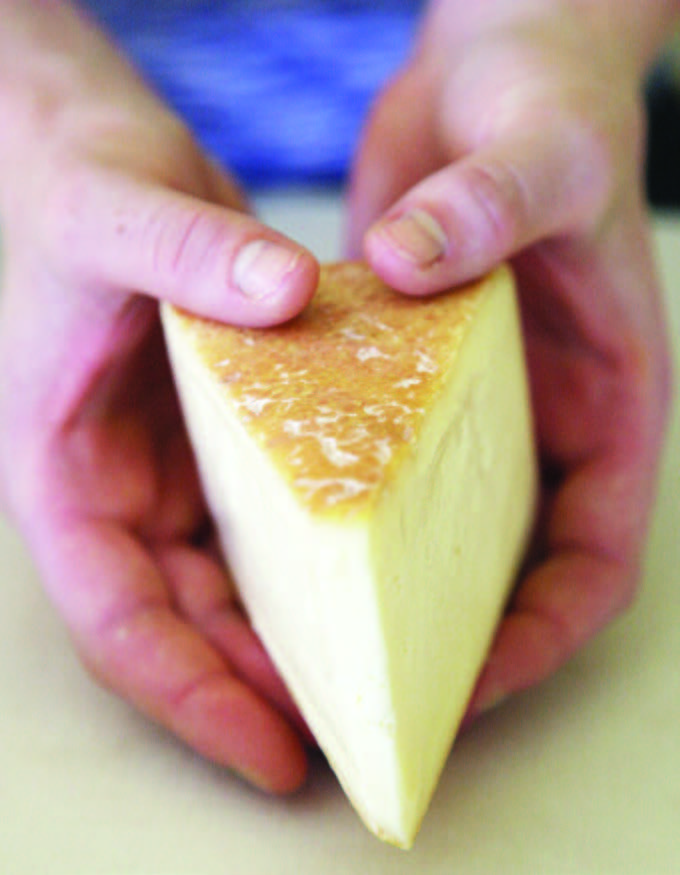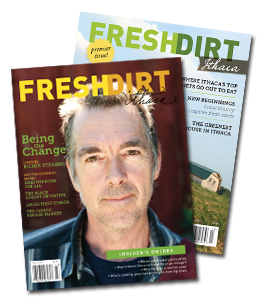New Beginnings: Keeley’s Cheese Co.
Keeley McGarr returned to her family’s dairy farm in King Ferry to launch her own cheesemaking business. It’s only year two, and she’s already developed a following.

Photos by Lauren DeCicca.
NEW BEGINNINGS: A collection of profiles published in the Fall 2011 issue of Fresh Dirt Ithaca.
An ethnomusicologist turned breadmaker. A healer who also makes natural beauty products. A woman who returned to her family’s dairy farm to start making artisanal cheeses. And a young couple who decided to create a permaculture farm. What is it about this region that inspires people to find new beginnings?
Most people, when they wake up, begin their day with a leisurely cup of coffee and perhaps the morning news. On production days, Keeley McGarr starts making cheese at 5:30 a.m. and doesn’t stop until just before noon. Call it the life of an artisan cheesemaker—and the life of a Finger Lakes farm girl who happily came home.
Raised on McGarr Farms in King Ferry, where her family has raised dairy cows for more than 50 years, Keeley spent her childhood in the barns. As a youngster she intimately knew the smell of hay and the taste of good, fresh milk. As a teenager, she decided she wanted to work on the farm somehow, but it took her going to college to decide it would be as a cheesemaker.
In just her second year as the owner of the Keeley Cheese Company, which she operates using milk from her family’s 175 registered Jersey and Holstein cows, Keeley is a young entrepreneur to watch, as well as the secretary of the new Finger Lakes Cheese Trail (flcheesetrail.com), a group of eleven farmstead cheeseries that use milk from their own herds and make cheese right on their farms.
“My first goal is to make high-quality products,” she says of her Irish-style cheeses that sell at the Ithaca Bakery, Ithaca Coffee Company, Treleaven Winery in King Ferry, and her own website (keeleyscheeseco.com). “World-class, that’s what I’m striving for.”
Educated at the University of Vermont, Keeley earned a degree in animal science and in her spare time explored Vermont’s many cheesemaking opportunities. Already no stranger to dairy production, she took courses at the Vermont Institute for Artisan Cheese and worked for Shelburne Farms making Vermont cheddar cheese. In 2008, she traveled to Ireland and worked for the renowned cheesemaker Gubbeen Farmhouse in West Cork, where she learned the intricacies of making washed-rind cheeses in the tradition of muenster, tallegio, and brick.
 The trip overseas also made Keeley wonder if cheese sales could help sustain her family’s struggling farm. Dairy farmers often are subject to wildly erratic prices, she explains. In 2009, for instance, the price of milk dropped so low that it didn’t even cover her family’s production costs. “It’s not sustainable to be getting less money for your product than it costs to produce it,” she says. Therefore locally made cheese, she reasoned, could be a valuable new source of revenue.
The trip overseas also made Keeley wonder if cheese sales could help sustain her family’s struggling farm. Dairy farmers often are subject to wildly erratic prices, she explains. In 2009, for instance, the price of milk dropped so low that it didn’t even cover her family’s production costs. “It’s not sustainable to be getting less money for your product than it costs to produce it,” she says. Therefore locally made cheese, she reasoned, could be a valuable new source of revenue.
She secured loans and renovated an old farmhouse on the McGarr property into a “Cheese House.” She bought a 200-gallon dual vat for manufacturing and created an underground cellar that serves as a cheese cave.
Keeley’s makes three raw-milk cheeses, which are typically aged for at least 60 days: Across the Pond, a buttery and earthy semi-soft cheese washed with salt water; Pond Hopper, a semi-hard cheese; and Brida con Vino, which is washed in Treleaven’s Dry Riesling wine.
Sales already have been so strong that brida con Vino sold out entirely last March, and customers keep asking for more cheese and new products, Keeley says.
But a few new business hurdles present themselves. First, Keeley says, she’s still “feeling out” one cheesemaking intricacy. McGarr Farms operates on 400 acres and uses a rotational grazing system that allows its cows to munch on grass, and occasionally locally grown grains, for four seasons out of the year. A system that gives cows the best nutrition, it also can make a cheese taste different from season to season.
Second, Keeley is super busy. After six hours of production on the days she makes cheese, she spends the afternoons bookkeeping and taking care of shipments. Then at night, she helps out in the family’s cattle barns.
Nevertheless, she hopes someday to use up to 20 percent of her farm’s milk supply strictly for cheese, yogurt, and other dairy products. Presently she uses only about 2 to 3 percent.
On weekends she sells cheese at the Ithaca Farmers’ Market and the Central New York Regional Market in Syracuse, where she regularly is greeted by returning customers and regulars. “Just realizing that people really care about what they’re eating and that I have a story behind what I’m selling—it makes me leave the markets smiling,” she says.
She also says that positive customer feedback, in addition to her success, makes her look at her native region with fresh, enthusiastic eyes.
“It took going away to college and then coming home to realize the Finger Lakes region is a pretty cool place,” she says. “There’s a huge variety of people making all kinds of cool food, with all kinds of interesting businesses coming up.”




 Published quarterly, Fresh Dirt Ithaca celebrates the area's innovative spirit and lush beauty, with:
Published quarterly, Fresh Dirt Ithaca celebrates the area's innovative spirit and lush beauty, with: